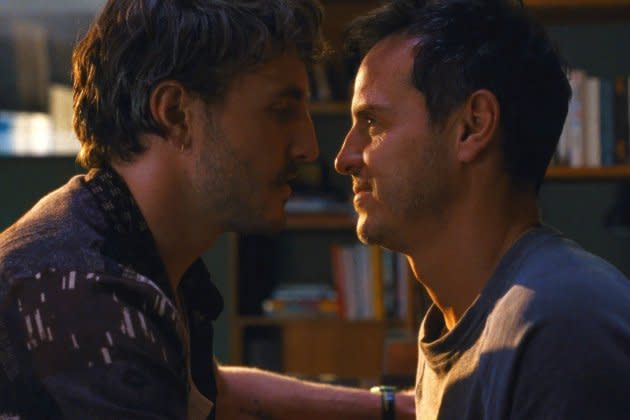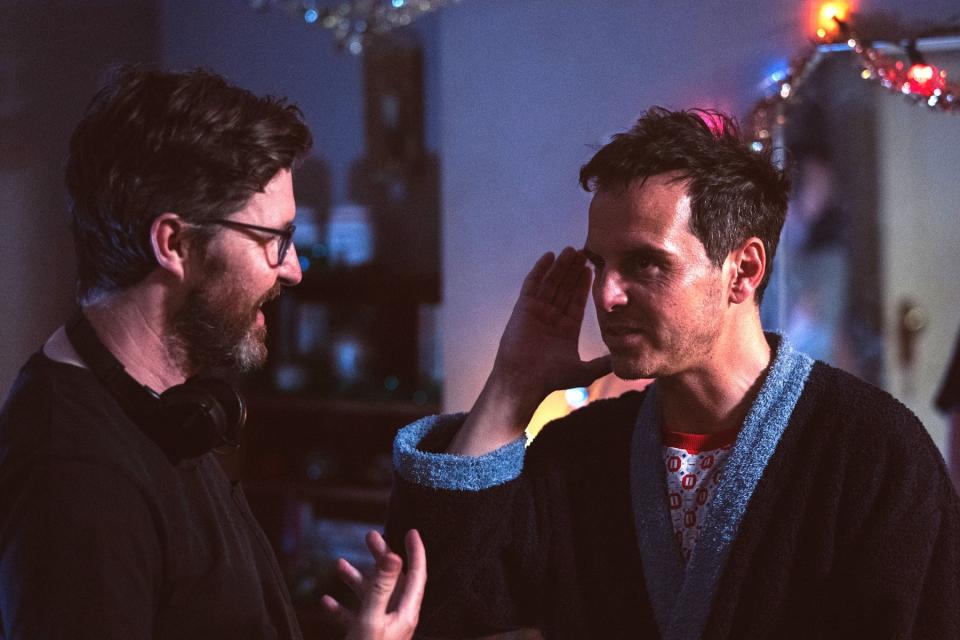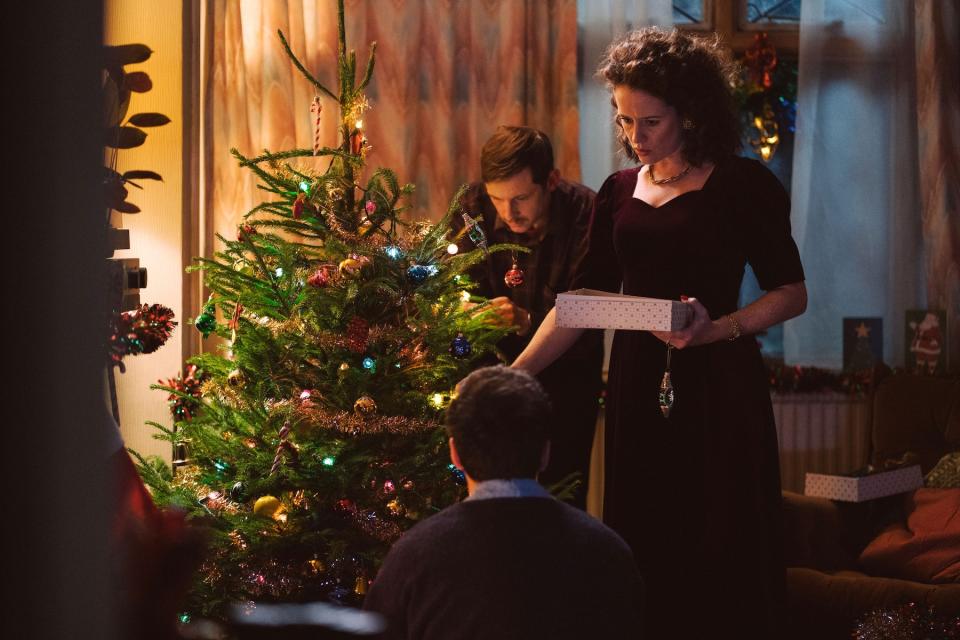‘All of Us Strangers’: Inside the Year’s Most Haunting Love Story
- Oops!Something went wrong.Please try again later.
- Oops!Something went wrong.Please try again later.

Unlike the scores of paranormal investigators on reality TV, Andrew Haigh has made a career as a successful cinematic ghosthunter, chasing after entities whose presence is unquestionably felt.
The British filmmaker’s apparitions take the forms of suppressed pain, unresolved trauma, unspoken resentment, and earth-shattering secrets in movies often, though not exclusively, focused on romantic (gay) relationships. In his latest drama, All of Us Strangers, loosely adapted from Taichi Yamada’s 1987 novel Strangers, those specters from his main character’s past are more literal than ever before.
More from Rolling Stone
'All of Us Strangers': Paul Mescal and Andrew Scott's Ghostly Love Story Will Break Your Heart
How Hollywood's Sex Scenes Will Change With the New SAG-AFTRA Contract
Ridley Scott Is Terrified of AI: 'It's a Technical Hydrogen Bomb'
“I’ve always been interested in the nature of ghosts, as in the things that haunt us and confuse us and have an effect on our lives,” Haigh tells Rolling Stone.
All of Us Strangers follows Adam (Andrew Scott), a gay screenwriter in his forties living alone in what appears to be a mostly empty London apartment building, transcends the barriers of time and space to reconnect with his deceased parents (tenderly played by Jamie Bell and Claire Foy). At the same time, Adam falls hard for his younger neighbor Harry (Paul Mescal), an equally adrift soul.
“His films lack sentimentality, but they’ve got an incredible emotional authenticity to them,” Scott says about Haigh’s storytelling. “He’s totally without cynicism, but he’s also not interested in being dark for darkness’ sake.”
That Haigh recently earned the Best Screenplay prize from the Los Angeles Film Critics Association (LAFCA) seems almost serendipitous, considering he wrote this piece while living in the city for several months at the height of the Covid pandemic in 2020.
Of his five features, Haigh argues he’s only ever made “single-protagonist films.” Despite most of them exploring couples, he consciously devised them so that they only explore the world of the lead, and not characters in the periphery.
“Even in 45 Years, it’s all with Charlotte Rampling. In this film, it’s almost all with Andrew’s character, apart from two shots. Weekend, it’s all with Russell,” Haigh noted. Charlie in Lean on Pete, it’s all with him. You never see anything outside of what he experiences.”
That approach, as well as many of his themes, dates back to Haigh’s mostly unseen 2008 debut Greek Pete, a docudrama that follows a group of London-based male sex workers, with one of them, Peter Pittaros, serving as the central figure. Made for about £7000, Haigh believes that first effort was crucial to his development as a filmmaker.
“I made that movie out of sheer frustration of not having made anything. I wanted to do something that felt very much out of my comfort zone, to throw myself into a world that I didn’t understand,” the director maintains. “Even the way I shot that film, with quite a lot of long takes, has informed my work going forward. I appreciate what that film is in its smallness.”

The similarities can be quite glaring. In Greek Pete, the titular character, a disarming hunk, reminisces about the holiday season with his Greek family. He’s distanced himself, aware that his loved ones will reject his sexual orientation and profession.
“I’ve always been really interested in how we, [queer people], become separated from family. Even if they’re accepting,” says Haigh. “You are on the edges of that family.”
For Adam in All of Us Strangers, Christmas is key to unlocking his childhood memories, particularly those associated with his not-so-supportive father. “Christmas fits in with this idea of family coming together. It’s very heterosexual,” Haigh notes. “It has all of those things that you don’t feel quite part of, and then you try and recreate that, which is what the group of male escorts do in Greek Pete.”
Haigh admits that a certain loneliness plagues the majority of the fictional people he puts on screen. Yet they don’t dwell on that sentiment, but rather attempt to overcome it.
“We are alone in the world and it’s about us trying to navigate through the world connecting with people, reaching out for people, longing for things that we think will make us less alone,” he says. “All of my films are definitely starting from that basis of, ‘Here’s a character feeling alone in the world. What do they want to do to feel less alone?’”
“Loneliness exists within all of us. And Andrew’s not afraid to explore that. His characters are trying to remove out of loneliness, and that’s what we all do,” adds Scott of Haigh’s oeuvre. “I don’t think there are lonely people in the world and people who are never lonely. It’s something that we all experience at some point, even in a relationship.”
Take quiet Russell (Tom Cullen), the unassuming gay lead of Haigh’s 2011 breakthrough Weekend, as proof of that statement on solitude. While not in the closet, Russell, a lifeguard who grew up an orphan, moves through life hoping to not call attention to himself. His timid demeanor seems almost identical to that of Andrew Scott’s Adam. Haigh always thought of All of Us Strangers as a metaphysical expansion of Weekend.
“I was worried at one point that this new film would be perceived as with ghosts, which I didn’t want this to be,” Haigh reasons. “But I know that it’s connected to that film. I am 12 years older than I was then. I see things slightly differently than I saw things then, life has changed a lot since then. But I still wanted it to be a conversation with that film.”
Both Weekend and All of Us Strangers feature a catalyst — a love interest — that pushes their respective heroes to confront their loneliness. Harry does just that for Adam, while Glen (Chris New), an extroverted artist, serves that same purpose for Russell. “There are things that appear in our lives and throw us off balance,” Haigh says. “Whether that be a person coming into your life or in 45 years it’s a letter that arrives or if it’s Lean on Pete, it’s him having to run away because his dad has died.”
In Haigh’s three movies with gay protagonists, homophobia lurks. It appears as slurs yelled at Russel and Glenn while they kiss at the train station in Weekend. All of Us Strangers sees Adam struggling to forget the bullying and violence he experienced growing up.
“I’m interested in the legacy of homophobia and how that can still affect you in the present,” says Haigh. “That to me feels closely related to grief and to ghosts. Those difficult things that we’ve experienced, whether it be trauma, whether it’s losing someone, whether it’s experiencing being bullied at school, they’re very easy for us to try and push away, but they’re all still there bubbling under, and in this film it’s about them coming to the surface.”
“As you get older, and you are told that everything is better and that you should be fine now, the more it makes people want to go back and revisit and look at the sources of their pain or the sources of what’s defined who they are as adults,” he adds.
The amorous unions in Haigh’s movies always seem to come to an end by the time the credits roll, but he thinks that doesn’t take away from their significance in someone’s life.
“I don’t believe in one true love,” the director says. “I don’t believe that there is one soul that’s out there for you. I believe you can have a lot of loves in your life and sometimes they can be for a weekend, they can be for 45 years, or somewhere in between.”
Haigh is shocked to learn about the current online discourse questioning the need for sex scenes in movies. To eliminate an integral part of how people connect with each other, he says, means to not want cinema to reflect all aspects of life.
“I’d love to sit down with the younger generation and understand why they don’t want to see sex on screen,” he says. “It’s their choice. If they don’t want to see it, they don’t have to see it. But I’m Gen X and, hopefully, it would still be my choice to be able to show that.”
So, why not see some cum? People do like to lick it up and then kiss. It’s also just real.
A pair of steamy encounters between Scott and Mescal’s characters are featured in All of Us Strangers, one of them involving bodily fluids. “A scene can be sweet and intimate and really sexy at exactly the same time. And I’m always trying to find the sweet spot between all of those things,” says Haigh. “So, why not see some cum? People do like to lick it up and then kiss. It’s also just real.”
For Scott, those intimate encounters, and the heart-to-heart chats that follow them, helped him understand who Adam is and why he behaves the way he does.
“Adam is a very physical character. And he hasn’t been touched in years probably, not just sexually. That’s why he conjures his parents up. The relationship that you have with your sensuality when being hugged by your parents is enormous,” Scott says. “And not to have that affects the way he is as an adult, and how he relates physically to other people.”
Haigh’s interest in characters disconnected from (and sometimes, haunted by) their parents comes from a personal place. “There are absent parents in all of my films. My parents got divorced when I was nine. It was complicated,” recalls Haigh. “The role of absence is big in my life, so it’s found its way into my films and I’m always trying to deal with it without it just being, the parents got divorced. I’m trying to deal with it in a more profound way.”
He remembers his parents’ separation as an enormously challenging time, during which he had to live with his father. It was also around when Haigh was coming to terms with his sexuality. Though the decades have piled on, he doesn’t feel so far removed from the boy who weathered that period.

“The idea that I’m 50 is insane to me,” he says. “I can’t understand how that’s happened. Because I can’t see the change in me. Of course, I have changed. I’m not like I was when I was 13, but I still feel like I am that person that I was when I was 9, 10, 11, 12. That is still me. I’m just now in a slightly more adult body and living in an adult world.”
Through the power of fiction, Haigh allows Adam to resolve his conflicts with his parents. Not only does Adam get the opportunity to confront his father about his not-so-latent homophobia, and come out to his mother, but he also shows them compassion and grace, realizing that, despite their physical absence, their influence, both positive and less so, remains.
“Toward the end of the film, Adam understands that he can also be there for Harry,” says Haigh. “If you can feel compassion coming to you from someone else, hopefully you can give that to another person. That to me is what love is about — being there for someone else fully.”
If there’s one quality that differentiates All of Us Strangers from Haigh’s other films it’s that he often sidesteps his signature naturalism to lean into the supernatural, playing with what is real and what’s not within Adam’s purview.
“I didn’t want it to be crazily melodramatic, but I wanted it to be genuinely emotional. I’d never have done that 10 years ago. But I’ve gotten older, and I’ve got two kids now. I am softer than I was,” he admits. “When you are younger, you are terrified of going near that kind of emotion. I’m less ashamed of it now and wanted to make sure that the film wasn’t ashamed of it either.”
Best of Rolling Stone

